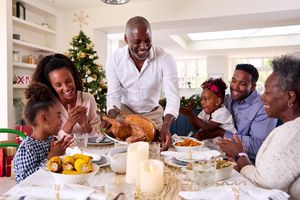
From Left: Tourism and Wildlife Cabinet Secretary, Rebecca Miano, Senior Counsel Fred Ngatia, Canon Evans Omollo and Dr Kenneth Ombongi.
Most families have unique holiday traditions they cherish and hope to pass down to their children. These rituals create memories, foster unity, and keep the holiday spirit alive across generations.
For Rebecca Miano, the Cabinet Secretary for Tourism and Wildlife, these Christmas traditions are what make holidays worth looking forward to.
She said when she was growing up in Nyandarua County, “the period between one Christmas and the next felt like it was 10 years apart.”
“We eagerly waited for Christmas all the year. The preparations for Christmas started like a week before. We’d wash our clothes, clean the home and on the eve of Christmas, we’d cook all the food that we’d eat for Christmas. This was the time to eat food that we could not ordinarily afford throughout the year. My mother was a trained chef, so we’d look forward to eating foods like meat pies and new cake flavours. We couldn’t afford to buy decor, so we hung homemade decorations and patterns (we) made using paper. Then from midnight, the church choir would go from house to house singing hymns and we would get out to join them in singing. It was only after this that we could go to sleep.”
She recalls that on the morning of Christmas, it was an unspoken rule to go to church. Christmas also meant getting new clothes for Rebecca and her 13 siblings.
“After church, we would go home as a family and eat the food we’d prepared on the 24th. We often ended up overeating,” she chuckles.

Tourism and Wildlife Cabinet Secretary Rebecca Miano during an interview at her office in Upper Hill, Nairobi on December 17, 2024.
Many years later, these are the same traditions in her house and she is passing them down to her children. Only difference is in her home, the holiday spirit begins in mid-November.
“I have kept the tradition. I decorate my home from November 15 and keep the decor up until January 15 the new year. If you come to my home right now, you’ll find that I have a huge, fully decorated Christmas tree. We have all the Christmas decorations and the lights. Even outside, I have small Christmas trees that are decorated. Luckily, these days, there are professionals that you can entrust to do the decorations for you. I want my children to feel the holiday spirit the way I felt those days,” Ms Miano says.
“I go all out to make memories for them. We spend Christmas together, prepare meals and invite family. On some occasions, we travel out of Nairobi, to Mombasa or other destinations across the country. However, the magic of being together with family for Christmas is a tradition we have maintained,” the CS tells Lifestyle, adding that she started decorating the house over 10 years ago and has faithfully done it throughout the years.
Does she do the cooking? Ms Miano says she prefers to cook the fried chicken and chapatis. “However, since we often have the whole extended family coming over, sometimes we hire private chefs to come and assist with the cooking. One thing I enjoy is being there while serving the meals and interacting with the guests,” she says.
As if reliving all the memories from her childhood, Christmas carols are a must-have in her home.
“This past weekend, I invited friends and relatives to do Christmas carols at my home. We invited a singer to come and perform, and together we sang along. We also did Thanksgiving, just sharing and reflecting on what the holidays mean to all of us; it brings joy, gratitude, hope, togetherness and unity. No matter how busy it might get, we have always managed to come together during Christmas. Even our children, if they have to go see their friends or do other activities, they do it probably on the 26th or any other day after Christmas or before Christmas day,” the mother of three says, adding, “our son is getting married early next year. We might have to set him free to go and continue the tradition that we have taught him.”
Family as an anchor
Why are holiday traditions important? Having all her adult children show up on Christmas Day, Ms Miano says, is attributed to building tradition and habit.
“Building of a habit is very powerful, and because they are used to it right from when they were young, it’s now not an issue getting them to show up to spend time with my husband, and I. Spending Christmas with the family is a good time to reflect on the year, the blessings that you have had, the challenges, and a good way to refresh for a new year, and strengthen family ties. I have learned that no matter what job you do or what positions you hold, family is still your foundation. It is the anchor that keeps you strong,” she says.
For Senior Counsel Fred Ngatia, the holiday season is not a time to advance oneself but to honour and celebrate with others. For the past 15 years, his holiday has been spent with patients at the Nairobi Hospice.

Senior Counsel Fred Ngatia during an interview at his office in Upper Hill, Nairobi on December 17, 2024.
“The hospice has many patients in palliative care who have very few people to support them. So, throughout the year, I support the hospice, and then towards Christmas (a week before), we have a family day where we invite terminally ill patients from outside and those inside the hospice, and we have lunch together. This is the most joyous experience I have had during the holidays. Then we have a package for all the patients. Sometimes, it has foodstuffs, particularly dry foods and they get to carry these with them as they go,” the 68-year-old says.
Why does he think the holiday season should be about others more than self?
“The Christmas season is a time to show the humility in all of us. After all, our Saviour, Jesus Christ, humbled himself to be born as a man in Bethlehem, right? It’s a time for that humility, where even the king becomes the most lowly person, and share this time with your brethren. This is my vocation,” the staunch follower of the Catholic faith explains.
The idea of selfless giving during the holidays contrasts how Mr Ngatia grew up, and it is a new tradition that he is fostering in his home.
“When I was growing up, Christmas was just a lot of excitement without knowing its fullness, but that is because of the nature of our knowledge at that time. We would go to church and then have a lot of fun thereafter,” he recalls about his time growing up in Nyeri.
Traveling with spouse
With his family, Mr Ngatia says they try to get together every holiday.
“Sometimes it can be difficult because they are all grown up, but we always talk on the phone and ensure that we come together before the season ends,” he says.
With the children out of the nest, Mr Ngatia has also embraced a new tradition: travelling with his wife.
“We travel to a new place three or four days before Christmas. Normally, it is usually a trip to a place we don’t know about – our children surprise us; they plan the trip for us.
We have travelled to many places, both locally and overseas. What we always try to do is to go to a place that has a connection with Christianity. You know, there are some places you could go, and then you don’t have any churches. Even when we travel, we try to find out where we can give charity.”
Gifting
Joyce Kimani, a human rights defender, introduced gifting as a family tradition among her siblings and friends.
It has been a tradition for her family for the past five years, and she says it has helped foster their family ties.
“It is called Secret Santa. I learnt about it in 2019 when I was working in Uganda. My workplace did Christmas Santa; it was the first time I’d heard the concept. Naturally, I became very excited and wanted to emulate it back in Kenya. So, when I came home in December of that year, I did it with my family and friends for the first time. It was successful and, since that day, we have always done Christmas Santa,” she says.
Christmas Santa works in the same way the legendary Santa Claus did.
“Secret Santa is organised through a website called DrawNames.com,” she explains.
“It’s a fun way to draw names online instead of using slips of paper. The administrator inputs everyone’s names into the system, and it automatically assigns who gifts whom. Each participant gets a unique link to find out who they’ll be shopping for but the real twist is that the “gifter’s” identity remains a mystery until the actual gift exchange,” she says with a smile.
“It is all about the suspense. Knowing who you’re buying for while keeping your own identity a secret makes the whole experience even more exciting.”
“With my family, we do the gift-giving on the eve of Christmas. With my friends, we set a date before Christmas when we meet and exchange gifts. Some people have to explain the reason for getting a particular gift, yet for others, it is automatic especially where the gift is a reflection of what someone does in their professional careers.”
Now, Ms Kimani is proud to see even the children in her family starting their own Secret Santa.
“My nephews and nieces, who are as young as five, are also doing Secret Santa. This has helped them to bond well as cousins. They begin saving early on in their piggy banks because they know they will be gifting someone as the year ends. We intend to keep passing it on to our family. It is an idea that I would want to see continue. Every year, you draw a different name. This way, you get to understand another person differently and learn to love them differently,” Joyce, who has six siblings, says.
Exodus upcountry

Dr Kenneth Ombongi is an Associate Dean in charge of Research and Postgraduate Studies at the Faculty of Arts and Social Sciences at the University of Nairobi.
Dr Kenneth Ombongi, an Associate Dean in charge of Research and Postgraduate Studies at the Faculty of Arts and Social Sciences at the University of Nairobi, says that holiday traditions are crucial for the passing down culture and maintaining family ties.
One family tradition that has withstood the test of time, according to Dr Ombongi, is the long exodus from the city to upcountry.
“We are a country that is on the transition from tradition to what one can describe as colonial modernity. In the olden days, people had opportunities after the day’s work. Grandchildren will sit with their grandparents and hear stories of folklore. When the colonialists arrived, they brought in urbanisation, with many people moving to the urban centres. However, only the British settlers were allowed to be real residents of urban Kenya. In response, Africans devised a way to get back to their villages every once in a while. It became the movement to the countryside during the holidays. Today, it is a time for families to go be together and also appreciate the passing down of a community’s culture from the grandparents,” he says.
Sharing his own experience, Dr Ombongi says that respected holiday traditions ensure the continuity of family ties even when the matriarch and patriarch are no longer alive to hold the family together.
“My father had two wives, and the Christmas season used to bring us together. Even when there was some rivalry between the two wives, they had to bury the hatchet every Christmas and come together. It became a family tradition and has continued even now when my father is no longer alive. Every year, my two mothers, my 17 siblings, and I try to always meet during Christmas. We have kept this going since 2010, when our father passed away.”
According to Dr Ombongi, holiday traditions must begin at a very young age so that children understand how things should be done.
The Provost

Provost of the All Saints Cathedral Canon Evans Omollo.
Canon Evans Omollo, the Provost at the All Saints Cathedral, says that holiday traditions are crucial to maintaining family ties and unity.
“I grew up in a Christian family and the Christmas season was filled with a lot of emphasis on who Jesus is and what Jesus came to do. That Jesus is a gift to the world. There were other things like you must have new clothes, new shoes, growing up as little kids. I think that brought a lot of joy and anticipation for Christmas all the time. But something else I have seen from my upbringing and the contexts that I’ve interacted with as a church leader is that Christmas is a time that brings families together. So, people tend to travel and families congregate to spend time together. Growing up, our parents would always emphasize to us to look out for people who are not able to care for themselves, who are needy around us and you gift them. I think the whole theme of family is very strong this season.”
He adds, “In my family, my wife and I come together, give our children some money and they can buy gifts. On Christmas day, we open the gifts together as a family. The good thing with family traditions is that they enable people to touch base, to catch up and sometimes where there is tension it offers an opportunity for reconciliation and solving disputes. Family bonds are all that matters because, after everything else, family is what will remain. Whether you work in the government, private sector or religious space, where I am, you go back to the family. So, I would encourage people every single year to create a substantial amount of time to be with family, to have fun, to enjoy, to celebrate, and to give to each other.”









